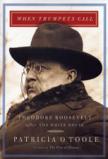The Conjurer
The Rough Rider, the Bull Moose, the president who used his office as a bully pulpit, the man who carried the big stick, the asthmatic child who spent mornings on horseback, the hunter of lions who nevertheless spared one teddy bearwhat reader cannot already limn the life of the 26th American president? Despite more than 600 books on Theodore Roosevelt, Patricia O’Toole, who teaches writing at Columbia University and is the author of a portrait of Henry Adams, offers yet another insight into the man who not only breathed life and exuberance into the presidency, but who also never stopped running for president.
O’Toole’s fascination is with Roosevelt’s unceasing politicking in the decade after he left office. Celebrating William Howard Taft’s inauguration, Roosevelt told the press, I have nothing to say. He believed as he sailed off to Africa that Taft’s agenda was his, but such assurance was short-lived. Taft pursued his own ideas, and Roosevelt, finding the role of sage was several sizes too small, eagerly joined other disgruntled party members. He delivered speeches that were a summa on his presidency and a repudiation of Taft’s and readied himself for another presidential candidacy (this, of course, in the years before the 22nd Amendment). Rejection by the Republicans in 1912 did not stop him; he became the Progressive Party candidate, opening the door for the Democratic win. But for Teddy 1916 loomed as yet another opportunity; there were mid-term elections to promote. And when he could not stop Woodrow Wilson with his eloquent, although often vitriolic, attacks, he was still hoping for final triumph in the 1920 presidential campaign, as he wrote in a letter to Rudyard Kipling in late 1919.
Despite the familiarity of the story, O’Toole engages the reader with her deft turns of phrase. Describing Roosevelt in his most immediate post-presidency years as a Mozart shorn of music, O’Toole captures the energy of this inveterate politician when she suggests that to travel with Theodore Roosevelt was to travel in a carnival led by a conjurer and trailed by an idolatrous throng. And whether it is her remark about Robert LaFollette’s need to get into bed with another senator, whom O’Toole depicts as a man whose virtue was never in question because he had none, or references to Alice Roosevelt Longworth, who often came to visit, lugging a valise crammed with unhappiness, O’Toole reminds the reader of the humanity of her subjects. And having laid out Roosevelt’s increasing frustrations with Wilson and his war policies, she delights the reader with a catalog of Roosevelt’s diatribes against Wilson. Roosevelt called Wilson a physically timid man, a supple and adroit rhetorician without a throb of patriotism, a dexterous thimble-rigger, a cold-blooded, shifty, unscrupulous politician, an infernal skunk, an acrid pacifist and, perhaps for Roosevelt the most condemning phrase, a Byzantine logothete.
Beyond Roosevelt’s interminable politicking, O’Toole relates the saga of his African safari in a manner that will deeply engage the 21st-century reader. Roosevelt and his son Kermit shot 512 animals on their trek through British East Africa, carnage that often appalls environmentalists of today. True, Roosevelt arrived in Africa as a hunter, as an imperialist from a Euro-centric world and as a consumer of resources, with his entourage of 200 guides and porters. But the trip was a scientific venture as well, sponsored by the Smithsonian Institution, although these new samples largely duplicated the Smithsonian collection.
Moreover, the Roosevelts obtained licenses to shoot their quarryexcept for the lions and leopards, because they were vermin and could be killed without a license. Roosevelt’s idea that controlled hunting preserved a healthier environment for the remaining animals informed his environmental philosophy, but his diaries reflect an even more driven man. When frustrated in his pursuit of a lion kill, he was willing to shoot cubs; and Kermit’s pursuit of a green-faced monkey put other men’s lives in jeopardy. Sure of himself and steeped in the excitement of his adventure, Roosevelt never knew the East Africans, who had no word for president (just for king) and who, because the word Americani meant loincloth (after the cloth given to them for obvious purposes by missionaries), called him King of the loincloths!
This same sense of self and purpose permeated Roosevelt’s attempt to oust Taft in 1912. Flaunting tradition, Roosevelt traveled to Chicago, organized his followers to challenge the credentials committee, threatened to bolt the convention and, when he had lost every battle on the floor, walked across the street to the Progressive Party to accept its nomination. In a time when the television networks no longer carry gavel-to-gavel coverage of party conventions, when results are known long before the convention is convened, and when there are no more floor fights, state-by-state roll call votes, or any suspense, O’Toole captures for the modern reader the realities of machine politics before the advent of primary elections.
Perhaps the most poignant story is one this master of politics could not control in the end. Roosevelt himself was ever ready to go to war and exulted in the fact that his four sons (and a son-in-law) served in France in World War 1. Archie was wounded and Quentin died in a bombing raid over Chateau-Thierry. Roosevelt was bereft, knowing as a father he had inspired his sons to this duty, but he would not have it otherwise, and his deepest regret was that I was not allowed to go over myself and at least run the risk of paying the price my sons are paying.
This article also appeared in print, under the headline “The Conjurer,” in the April 4, 2005, issue.








